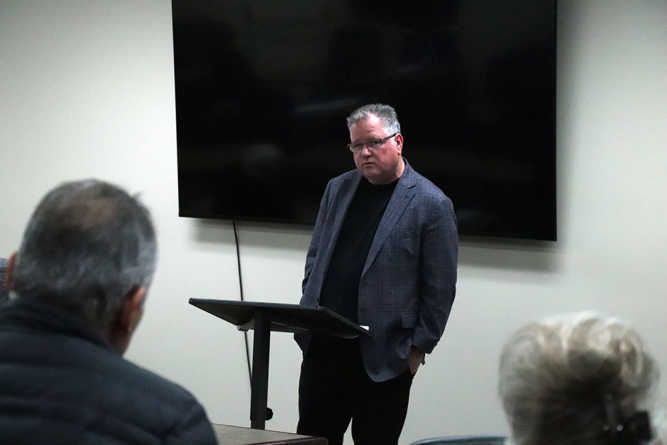EndrTimes
AND THE THIRD ANGEL FOLLOWED THEM, SAYING WITH A LOUD VOICE, IF ANY MAN WORSHIP THE BEAST AND HIS IMAGE, AND RECEIVE HIS MARK IN HIS FOREHEAD, OR IN HIS HAND. *** REVELATION 14:9
Sunday, December 14, 2025
What I Learned During My Visit to an Immigration Detention Center
What I Learned During My Visit to an Immigration Detention Center

A migrant being detained by ICE outside of Immigration Court in Harlingen, Texas. (Brian Strassburger, SJ)
Note: The names and countries of origin of those mentioned have been changed.
“Look for the red car in the parking lot behind the metro station.”
That’s where I met the other people with whom I traveled to an immigration detention center in rural Virginia, several hours from my own home. A friend of mine who works with immigration attorneys invited me to go and interpret between English and Spanish speakers and to assist the lawyers. I jumped at the opportunity. I’d never been to a detention center before and have rarely been to jails or prisons.
I was especially interested since the news this past year has been so filled with stories of immigrants being detained and deported. The government says that they are all criminals and the “worst of the worst.” Advocates say that they are mostly innocent mothers, fathers, teens and beloved community members. One thing everyone agrees on is that the number of migrants in detention is the most it’s ever been, and that the number of people being deported is sky high.
I wanted to see for myself who was actually being detained.
Jesuits were among those who gathered outside the Broadview Detention Facility in Broadview, Illinois, on November 1, requesting to offer Communion to migrants:
Saturday, December 13, 2025
Friday, December 12, 2025
Ilhan Omar's former husband surfaces in South Africa amid Trump's attacks: Report
Story by India Today World Desk


Ilhan Omar's former husband surfaces in South Africa amid Trump's attacks: Report
Ilhan Omar, the Minnesota congresswoman who has long been the target of politically charged rumours about her personal life, is once again in the spotlight following news about her former husband, Ahmed Elmi. According to a report by the New York Post, Elmi, whom Omar was legally married to from 2009 to 2017, has reappeared online after years of public absence.
The paper states that Elmi, 40, now presents himself on social media as a self-described "dirty dandy," posting flamboyant fashion photos, nightlife snapshots, and images alongside friends in upscale London cafes.
He has spent recent years studying in the United Kingdom, earning a doctorate at Bristol University before becoming a research assistant there, with academic interests reportedly including "critically queer studies," decolonisation, gender research, and Black humanities. More recent posts show him visiting Witwatersrand University in Johannesburg, South Africa.
 FORGOTTEN HISTORY
FORGOTTEN HISTORY
From Refugee to Power - The Controversial Journey of Ilhan Omar
Ilhan Omar, the Minnesota congresswoman who has long been the target of politically charged rumours about her personal life, is once again in the spotlight following news about her former husband, Ahmed Elmi. According to a report by the New York Post, Elmi, whom Omar was legally married to from 2009 to 2017, has reappeared online after years of public absence.
The paper states that Elmi, 40, now presents himself on social media as a self-described "dirty dandy," posting flamboyant fashion photos, nightlife snapshots, and images alongside friends in upscale London cafes.
He has spent recent years studying in the United Kingdom, earning a doctorate at Bristol University before becoming a research assistant there, with academic interests reportedly including "critically queer studies," decolonisation, gender research, and Black humanities. More recent posts show him visiting Witwatersrand University in Johannesburg, South Africa.
 FORGOTTEN HISTORY
FORGOTTEN HISTORYFrom Refugee to Power - The Controversial Journey of Ilhan Omar
Trump news at a glance: president ‘sick of meetings’ as Ukraine-Russia peace deal talks drag on

Explainer
Trump news at a glance: president ‘sick of meetings’ as Ukraine-Russia peace deal talks drag on
Trump’s press secretary suggested Trump was growing weary of process as Ukraine’s president under immense pressure to sign US deal – key US politics stories from 11 December 2025
Guardian staff
Thu 11 Dec 2025 21.08 EST
When it comes to Ukraine peace talks, Donald Trump is “sick of meetings just for the sake of meetings”, White House press secretary Karoline Leavitt told reporters on Thursday.
Leavitt added that the White House may send a representative to meet with European and Ukrainian officials this weekend if it feels like a meeting is “worthy” of the US’s time, adding that Trump is “extremely frustrated with both sides of this war”.
“He wants this war to come to an end, and the administration has spent more than 30 hours [on] this just in the past couple of weeks, meeting with the Russians and Ukrainians and the Europeans,” Leavitt said.
Ukraine’s president Volodymyr Zelenskyy has been under immense pressure from Trump to sign up to the US peace plan. In recent days Trump has attacked Zelenskyy, claiming he “has not even read” the draft peace plan, suggesting he lacks legitimacy and Ukraine should hold an election.
Zelenskyy said the Ukrainian negotiating team had sent their revised plan to Washington on Wednesday, and that questions over territory and control of the Zaporizhzhia nuclear plant were two of the remaining sticking points.
Leavitt said Trump was “aware” of Ukraine’s updated peace proposal, but offered no further comment.
When it comes to Ukraine peace talks, Donald Trump is “sick of meetings just for the sake of meetings”, White House press secretary Karoline Leavitt told reporters on Thursday.
Leavitt added that the White House may send a representative to meet with European and Ukrainian officials this weekend if it feels like a meeting is “worthy” of the US’s time, adding that Trump is “extremely frustrated with both sides of this war”.
“He wants this war to come to an end, and the administration has spent more than 30 hours [on] this just in the past couple of weeks, meeting with the Russians and Ukrainians and the Europeans,” Leavitt said.
Ukraine’s president Volodymyr Zelenskyy has been under immense pressure from Trump to sign up to the US peace plan. In recent days Trump has attacked Zelenskyy, claiming he “has not even read” the draft peace plan, suggesting he lacks legitimacy and Ukraine should hold an election.
Zelenskyy said the Ukrainian negotiating team had sent their revised plan to Washington on Wednesday, and that questions over territory and control of the Zaporizhzhia nuclear plant were two of the remaining sticking points.
Leavitt said Trump was “aware” of Ukraine’s updated peace proposal, but offered no further comment.
Lone Democrat's effort to impeach Trump fails miserably — because of his own party

Photo by Win McNamee/Getty Images
politics
Rebeka Zeljko
December 11, 2025
'We can't just impeach someone with no process.'
Dozens of House Democrats turned their back on their colleague who led the latest impeachment effort against President Donald Trump.
Texas Democratic Rep. Al Green's effort to force a vote to impeach Trump failed miserably on Thursday in a 237-140 vote. Forty-seven Democrats, including all of the Democratic leadership, voted present, while 23 Democrats joined Republicans to table to motion altogether.
'None of that serious work has been done.'
Although Democrats are typically enthusiastic when given the opportunity to kneecap the administration, both the leadership and the rank-and-file blocked the vote.
"We can't just impeach someone with no process, without any investigation," Democratic Rep. Ted Lieu of California said following the vote.
Rebeka Zeljko
December 11, 2025
'We can't just impeach someone with no process.'
Dozens of House Democrats turned their back on their colleague who led the latest impeachment effort against President Donald Trump.
Texas Democratic Rep. Al Green's effort to force a vote to impeach Trump failed miserably on Thursday in a 237-140 vote. Forty-seven Democrats, including all of the Democratic leadership, voted present, while 23 Democrats joined Republicans to table to motion altogether.
'None of that serious work has been done.'
Although Democrats are typically enthusiastic when given the opportunity to kneecap the administration, both the leadership and the rank-and-file blocked the vote.
"We can't just impeach someone with no process, without any investigation," Democratic Rep. Ted Lieu of California said following the vote.
Thursday, December 11, 2025
The Curious Case of Ilhan Omar & Her Family
August 08, 2019 JW INSIDE REPORT
The Curious Case of Ilhan Omar & Her Family
On this episode of Judicial Watch’s “Inside Report,” Investigative Journalist and former editor of PJ Media, David Steinberg discusses Representative Ilhan Omar & her family–along with potential fraud she may have committed.
Read about our ethics complaint against Rep. Omar HERE
Read David Steinberg’s article HERE
Wednesday, December 10, 2025
Tuesday, December 09, 2025
“A Counterfeit Kingdom”: Adventists Confront Christian Nationalism at Religious Liberty Summit
Natalie Bruzon| November 25, 2025| Reports![]()
Just days after writing about Adventism and Christian nationalism, I was sitting in the newly-built Paradise Adventist church. The compound—completed this year after the congregation’s previous building was destroyed in the 2018 Camp Fire, the deadliest wildfire in California history—stands as a testament to the community’s resilience. Still, I doubted whether the large sanctuary would fill. Butte County, recently reshaped by California’s Prop 50 redistricting, is a traditionally Republican stronghold in an otherwise Democratic state; in 2024, it voted red on nearly every ballot measure, including for US President Donald Trump.
Yet on November 15, three Adventist scholars made the case not only that our theology still has something vital to say about religious liberty, but also that the current administration poses real dangers to the separation of church and state. The Religious Liberty Summit—hosted by the Church State Council—was less a political conference and more a return to basic Adventism, a reminder that our roots and prophetic identity were always meant to prepare us for precisely this moment.

Just days after writing about Adventism and Christian nationalism, I was sitting in the newly-built Paradise Adventist church. The compound—completed this year after the congregation’s previous building was destroyed in the 2018 Camp Fire, the deadliest wildfire in California history—stands as a testament to the community’s resilience. Still, I doubted whether the large sanctuary would fill. Butte County, recently reshaped by California’s Prop 50 redistricting, is a traditionally Republican stronghold in an otherwise Democratic state; in 2024, it voted red on nearly every ballot measure, including for US President Donald Trump.
Yet on November 15, three Adventist scholars made the case not only that our theology still has something vital to say about religious liberty, but also that the current administration poses real dangers to the separation of church and state. The Religious Liberty Summit—hosted by the Church State Council—was less a political conference and more a return to basic Adventism, a reminder that our roots and prophetic identity were always meant to prepare us for precisely this moment.

Attendees fill the sanctuary for the Religious Liberty Summit on November 15 at the Paradise Adventist Church in Paradise, California. Image: Natalie Bruzon/Spectrum
Devon and Dawn Horning—local to Paradise since 2010—were the duo responsible for bringing the Religious Liberty Summit to the Paradise Church. Devon described his long-standing interest in religious liberty: “I have had this very big interest in separation of church and state and how that relates to current events,” he said, adding that studying “liberty of conscience and Roger Williams and the history of the Adventist Church” has shaped his convictions.
Devon and Dawn Horning—local to Paradise since 2010—were the duo responsible for bringing the Religious Liberty Summit to the Paradise Church. Devon described his long-standing interest in religious liberty: “I have had this very big interest in separation of church and state and how that relates to current events,” he said, adding that studying “liberty of conscience and Roger Williams and the history of the Adventist Church” has shaped his convictions.
Pacific Union Conference Jewish Ministry Launches Beth Ohr: Urban Center of Influence
By: David Gardner | April 18, 2023

The dream of starting a Jewish-Adventist congregation began more than 20 years ago in the hearts of several Jewish Adventists. Alan Reinach, Director of Public Affairs and Religious Liberty for the Pacific Union Conference, has long shared that dream and held the conviction that a permanent ministry must be established for our 800,000 Jewish neighbors in the greater Los Angeles basin.

Reinach, who is Jewish, has long been an inspiration for this project. “For decades, some of us who are Jewish Adventists have prayed and dreamed of congregations where Jews can be part of the Advent hope without giving up our culture or way of worship,” Reinach shares. “Such congregations are necessary if we are to fulfill Paul’s admonition that the gospel belongs ‘to the Jew first.’”
The hearts of the founders are on fire and burn with a passion to share with others the light Reinach and others of have found in the Torah and the prophets, as Leon Brown, executive vice president of the Pacific Union Conference, spoke about in his devotional message at the ministry launch.

The name of the congregation officially planted in Glendale, Calif., on February 28, 2023, is Beth Ohr. That name is inspired by the words found in Isaiah 60:1, which reads: “Arise, shine, for thy light is come and the glory of the Lord is risen upon thee.”
Subscribe to:
Comments (Atom)